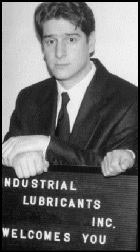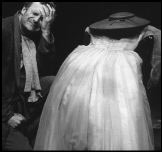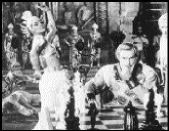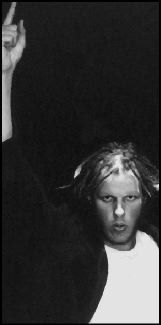HOSPITALITY SUITE
Union Garage, 1418 10th, 325-6500, $12 8 p.m. Thurs.-Sat. ends Sat., Feb. 2
SALESMEN AND GOD don’t mix. How can calculating businessmen stew over their existential angst? To do that, they would have to be human, wouldn’t they?
In Roger Rueff’s Hospitality Suite, this plagues Bob, a newlywed working for an industrial lubricant company and directed by his evangelical Christian beliefs. He’s been sent to a Wichita trade show with Phil, a jaded, soon-to-be divorced marketing rep who, by his own description, has been “shaking somebody’s hand one way or another my entire life.” They’re both there to support Larry, a trash-talking salesman who frets how his second-best company can only muster a pair of cheese balls and some celery sticks to woo his big-commission prospect away from the shrimp plate down the hall. Bob’s own humanity is tested when it turns out his spiritual interests connect him to the bonanza client. Phil and Larry drive him to compromise—they’re father figures, and fathers compete with their sons.
Playwright Rueff’s stylistic father is David Mamet, whose aggressive, subtext-rich dialogue he mimics with tribute-band exactness; he adopts not just Mamet’s American Buffalo cadences (testosterone tirades begin with “I’m just sayin'” or “Y’know what I’m talkin’ about?”) but his fascination with how people try to control each other. (Little wonder, then, that Kevin Spacey, who played the sales manager in Glengarry Glen Ross, made this a film vehicle for himself renamed The Big Kahuna).
The links to Mamet seem even more pronounced by the casting of Robert Pilletteri as Phil, a swarthy, New York-accented actor who reminds of Joe Mantegna. Newcomer Darren Meekin plays Bob with a pleasant sheen of doughy innocence. As Larry, Paul Custodio faces the unenviable task of following Spacey’s bravura performance, and, while his comedic talents entertain, one feels shortchanged by his persistently surface choices.
Rueff’s imitation could be dismissed as merely clever if he lacked something important of his own to say. Larry asserts that they don’t exist in Wichita as people, only as functions. If so, Bob argues, the company could just send robots. Larry replies knowingly that’s only “because they haven’t been invented.” Rueff challenges his salesmen—and us— to have a soul.








